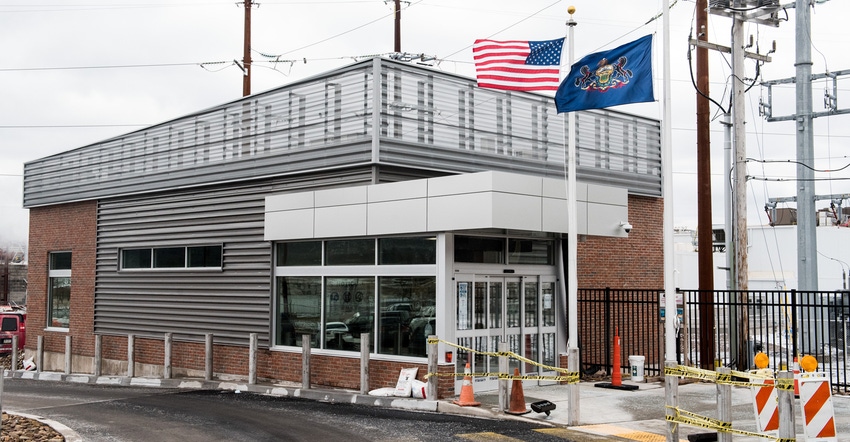March 1, 2021

Call it déjà vu all over again, but a major meat processor in the Northeast is once again shut down. But don’t blame COVID-19 this time. Blame the bad winter weather, neighbor complaints and, apparently, too much food waste.
Nicholas Meats LLC announced that it was shutting down because of its inability to spread processed food waste on frozen ground, which is legal in the state under certain conditions. On Feb. 9, Pennsylvania's Department of Environmental Protection ordered the plant to cease land application of food processing residuals on snow-covered fields, only days after the plant owners said it got approval to do just that.
With not enough on-site storage for their food waste, the plant’s owners said they had no choice but to shut down.
Jana McGuire, spokeswoman for Nicholas Meats, says the plant handles mostly dairy animals — cows, bulls and steers — from local farms, and organic, grass-fed and “natural” beef.
The state’s Department of Environmental Protection claims that it was acting on numerous neighbor complaints and environmental concerns over spreading on frozen ground.
Farmers, as a result, will have to look elsewhere for a place to take their cattle. John Painter, who has a 450-head organic dairy in Westfield, in neighboring Tioga County, says the closure may cost him $200 a head if he has to take his organic cull cows and steers to another facility that doesn’t process organic animals.
Nicholas Meats, he says, was a convenient place for him to take his cattle. He can make short, sometimes same-day appointments to get his cattle slaughtered, and they provided a short turnaround on payment.
Now, Painter will have to take his cattle to a sale barn, where he’ll likely earn less money because of transport and dealer costs, or he’ll have to take them to one of two other slaughterhouses — Cargill in Wyalusing or JBS Souderton — that may not pay him the organic premium. Plus, it takes multiple hours to drive there from his farm.
“Hopefully, [the closure] will only be a couple of weeks,” Painter says.
His steers are OK for now, but he has cows that need to go to slaughter soon.
The big picture, though, is what Painter is really concerned about. COVID-19 and now this closure show that in Pennsylvania and across the Northeast and mid-Atlantic, one closure of a slaughterhouse is a big deal.
And it’s not just a problem in the Northeast. This problem played out across the country this past year as the pandemic showed the inability of the food system to quickly adapt to changes. It showed how fragile the modern food system is to a disaster.
The closure of only one large beef packing plant by fire or by workers getting sick can cause ripple effects across the entire chain. Look no further than the JBS Souderton shutdown last spring at the height of the COVID-19 pandemic.
That plant, with a capacity of 2,500 head a day, is the largest beef packing plant east of Chicago. Its shutdown not only affected producers in Pennsylvania, but also all over the Northeast and mid-Atlantic.
The Northeast and mid-Atlantic are blessed with lots of smaller slaughterhouses, many of which are USDA-certified and provide a good service. But these small slaughterhouses don’t have the capacity to accommodate larger herds, and reporting that I’ve done shows that getting an appointment is nearly impossible these days — unless you’re willing to wait a few months or up to a year.
The Nicholas Meats plant was apparently dogged by neighbor complaints over odors from spreading food waste, according to news reports. Complaints from neighbors should never be taken lightly, especially when it’s more than one person complaining. I know too many farmers who want to be good neighbors and want to do the right thing.
Farmers have been told for years that there is a hungry market for locally grown food in the Northeast and mid-Atlantic. The question is, are those people willing to put up with some inconveniences to get their meat from central Pennsylvania instead of getting it trucked in from Nebraska or Texas?
Unfortunately, producers are the ones who always get the short end of the stick in these situations, and this case is no different.
So, if you’ve sent animals to Nicholas Meats and need to take cattle to market, you have a couple of options. The Jersey Shore — 814-364-1796 — and Middleburg cattle auctions are the closest cattle auctions and might be able to accommodate your animals.
Cargill Meat Solutions in Wyalusing and JBS Souderton are the state’s largest cattle processing plants. You should contact them directly to find out what options might be available to you.
At the very least, the COVID-19 pandemic should’ve opened eyes to the issues surrounding how fragile our food system is. Producers deserve fair, open and reliable markets for their products. If not, less of them will be around, and our food system will really be in trouble.
And no one wants to see that happen.
Read more about:
Covid 19You May Also Like




